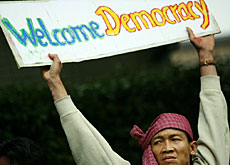ICRC condemns abuses in Myanmar

The Swiss-run International Committee of the Red Cross (ICRC) has accused Myanmar of murder and large-scale abuses against civilians and detainees.
In a rare public rebuke of a country, the organisation says the government is guilty of repeated violations of international humanitarian law and is refusing all entreaties to put a stop to them.
“The persistent use of detainees as porters for the armed forces is a matter of grave humanitarian concern,” said ICRC president Jakob Kellenberger in a statement on Friday.
“The actions of the authorities have also resulted in immense suffering for thousands of people in conflict-affected areas.”
The ICRC says it has repeatedly drawn attention to the abuses but the authorities have failed to act.
According to the Geneva-based agency, thousands of prisoners are forced to serve as army porters in clear violation of international humanitarian law.
It says the “institutionalised and widespread practice” has frequently led to the abuse of detainees and exposed them to armed conflict.
Many are said to have suffered from exhaustion and malnutrition, and been subjected to degrading treatment. Some have been murdered, says the ICRC.
Armed conflict
Government troops are also reported to have committed repeated abuses against men, women and children living in communities affected by armed conflict along the Thai-Myanmar border.
Among the charges levelled by the ICRC is large-scale destruction of food supplies, numerous acts of violence against the local population, including murder, plus arbitrary arrest and detention. It says thousands have been forced to flee their homes.
“The repeated abuses committed against men, women and children living along the Thai-Myanmar border violate many provisions of international humanitarian law,” said Kellenberger.
Carla Haddad, ICRC spokeswoman for Asia and the Pacific, told swissinfo that the organisation, which prefers confidential dialogue, had decided to go public because of the severity of the violations and persistent deadlock with the government.
“The ICRC has exhausted all possibilities to restore a meaningful dialogue with the government of Myanmar in view of putting a stop to the systematic abuses committed against civilians and detainees,” she said.
Offices closed
Government-imposed restrictions led to the closure of two ICRC field offices in Mawlamyaing and Kyaing Tong earlier this year. A third in Taunggy will be shut at the end of the month.
The ICRC’s remaining field offices in Mandalay and Hpa-An, which offer limited support for amputees and family prison visits, are still open.
“But these will have to be curtailed at some point if there are no positive developments,” said Haddad.
She added that the ICRC’s humanitarian work in Myanmar had reached “near paralysis” but insisted that the organisation was not about to pull out of the country.
“The ICRC is determined to stay in Myanmar and to carry on humanitarian work for the benefit of the most vulnerable people in the country,” she said.
swissinfo contacted Myanmar’s mission to the UN in Geneva but no one was available for comment.
swissinfo, Adam Beaumont in Geneva

More
International Committee of the Red Cross
Myanmar has been under military rule of one form or another since 1962, during which time its economy has collapsed and dozens of ethnic militias have waged civil war against the Burmese-dominated central government.
The United Nations says the junta has more than 1,100 political prisoners under lock and key.
Nobel peace laureate and opposition leader Aung San Suu Kyi has been under house arrest for 11 of the past 17 years. ICRC staff have not visited her since September 2003.
The ICRC began working in Myanmar in 1986, providing physical rehabilitation for mine victims and other disabled people.
The organisation now has just 13 expatriate and 164 national staff in the country, down from 60 and 298 two years ago.
It says increasingly severe restrictions imposed by the government have made it impossible for staff to move about independently in conflict-affected areas and have hampered the delivery of aid.
Since late 2005 the authorities have also prevented staff from visiting places of detention in accordance with its usual procedures.
Myanmar is not a priority country for Switzerland in terms of development cooperation, but the Myanmar/Thailand region is a priority field of operations in Asia for Swiss humanitarian assistance.
In recent years the Swiss government has mainly helped internally displaced persons (IDPs). Last year it spent SFr2.9 million ($2.35 million) on humanitarian aid.
Switzerland tightened sanctions against Myanmar in June last year because of the “precarious human rights situation” in the southeast Asian country.

In compliance with the JTI standards
More: SWI swissinfo.ch certified by the Journalism Trust Initiative










You can find an overview of ongoing debates with our journalists here . Please join us!
If you want to start a conversation about a topic raised in this article or want to report factual errors, email us at english@swissinfo.ch.